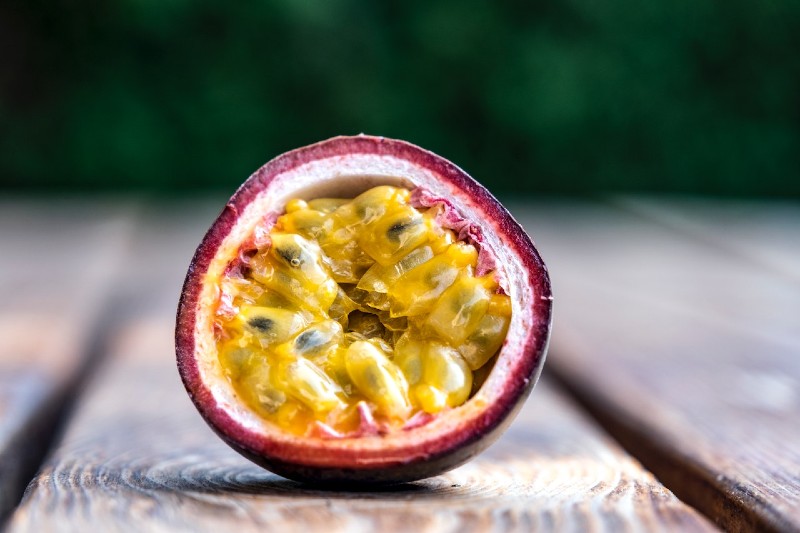What Does Passion Fruit Taste Like?
Quick Answer
The taste of passion fruit is a unique blend of sweet and tart flavors, often compared to a combination of citrus and tropical fruits like mango and pineapple. The fruit has a juicy, jelly-like pulp that contains seeds and is both aromatic and refreshing. Its complex flavor profile includes bright, tangy notes along with a hint of floral undertones.
What is Passion Fruit?
Passion fruit is a tropical fruit native to South America, known for its round or oval shape and tough outer rind.
The fruit’s interior is filled with a juicy, seed-filled pulp that is the edible part and is highly aromatic.
Passion fruit is rich in vitamins, particularly vitamin C, and other nutrients like fiber and antioxidants.
It is enjoyed for its unique, sweet-tart flavor and is commonly consumed fresh, as well as in juices, desserts, and sauces.
What Does Passion Fruit Taste Like?
Sweetness
The first thing many people notice is a certain level of sweetness, though this can vary depending on the ripeness of the fruit.
It’s not as sugary as fruits like mangoes or peaches but has a mild, natural sweetness that can be very pleasing.
Tartness
The tartness is one of the most distinctive aspects of passion fruit, providing a zesty kick.
It’s comparable to the tartness found in certain citrus fruits, like lemons or grapefruits, but with its own unique twist.
Citrusy Notes
The tangy, citrus-like qualities of passion fruit are often what make it so refreshing.
Think of it as a blend between an orange and a lemon, but with a tropical undertone that sets it apart.
Tropical Flavors
There’s a lush, tropical component to its flavor, similar to what you might find in a pineapple or a ripe mango.
This tropical taste is what often identifies it as a fruit perfect for summery drinks and exotic desserts.
Floral Undertones
Some people also detect floral notes in passion fruit, adding to its complex flavor profile.
These floral hints are subtle but can be likened to those in certain teas or even some kinds of grapes.
Comparison to Other Fruits
If you were to combine the tartness of a lemon, the sweetness of a mild mango, and the tropical punch of a pineapple, you’d get close to the flavor profile of a passion fruit.
It’s a fruit that stands on its own but also shares taste attributes with a range of other fruits, making it incredibly versatile and universally appealing.
What is the Texture of Passion Fruit?
The texture of passion fruit is unlike most other fruits. Once you cut through its tough, outer rind, you’ll find a cavity filled with juicy, jelly-like pulp and edible seeds.
The pulp has a somewhat gelatinous consistency, making it easy to scoop out with a spoon.
The seeds within the pulp are crunchy, offering a textural contrast.
Many people enjoy the unique combination of the juicy pulp and crunchy seeds, which provides both smoothness and a bit of bite in each mouthful.
FAQs
Is Passion Fruit Sweet Or Sour?
The fruit is both sweet and sour, depending on its ripeness. Generally, a more ripe fruit will be sweeter, while a less ripe one will have a tangy, tart flavor.
Does The Taste Change With Ripeness?
Yes, the taste can change with ripeness. A more ripe passion fruit will typically be sweeter and less tart, while an unripe fruit will be more sour and less sweet.
Is The Skin Of The Passion Fruit Edible?
The outer rind of the passion fruit is tough and generally not considered edible. Only the inner pulp and seeds are consumed.
Can You Eat The Seeds?
Yes, the seeds are edible and are often consumed along with the juicy pulp. However, some people prefer to strain out the seeds when making juice or using the pulp in recipes.
How Do You Know When A Passion Fruit Is Ripe?
A ripe passion fruit will have a slightly wrinkled skin and feel slightly heavy for its size. It should also have a rich, aromatic scent.
Can You Eat Passion Fruit Raw?
Yes, the pulp of the passion fruit can be eaten raw and is often scooped directly from the halved fruit. It is also commonly used in recipes for desserts, sauces, and beverages.
Does Passion Fruit Taste Good In Cocktails?
Absolutely, the exotic, sweet-tart flavor of passion fruit pairs well with various spirits and other fruit juices, making it a popular ingredient in cocktails.
How Does Cooking Or Baking Affect The Taste of Passion Fruit?
Cooking or baking can mellow out the tartness of the fruit and often heightens its sweetness. However, it may lose some of its bright, aromatic qualities when heated.
What Other Fruits Pair Well With Passion Fruit?
Passion fruit pairs well with other tropical fruits like mango, pineapple, and coconut, as well as with citrus fruits like lime and orange.
Does Passion Fruit Smell Good?
Passion fruit is highly aromatic and many people find its scent to be pleasing and even intoxicating. The aroma is sweet and tropical, with hints of citrus and sometimes floral notes.
The fruit’s fragrance is strong enough that it can often be smelled even before cutting it open.
This enticing smell is a good indicator of its complex and refreshing flavor profile, and it contributes to the fruit’s overall sensory experience.
What is the Best Tasting Passion Fruit?
The best-tasting passion fruit is generally one that is fully ripe. A ripe passion fruit will be slightly wrinkled, feel heavy for its size, and emit a strong, sweet aroma.
There are several varieties of passion fruit, including purple and yellow types, each with their own nuances in flavor. The purple variety is generally sweeter and less acidic, while the yellow type is often larger and more tart.
Depending on your personal flavor preferences, you might find one variety more appealing than the other.
Is Passion Fruit Poisonous?
Passion fruit is not poisonous and is widely consumed both for its delightful taste and nutritional benefits.
However, the tough outer rind is generally not eaten. It’s worth noting that some individuals may be allergic to passion fruit, although such allergies are relatively rare.
If you are trying passion fruit for the first time and have a history of food allergies, it is advisable to proceed with caution and consult a healthcare provider if necessary.
Also, the leaves and other parts of the passion fruit plant are not generally consumed and could be harmful if ingested in large amounts.


